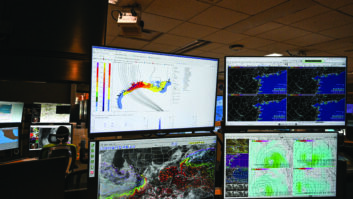What does your money say to you? – Salary Survey 2002
Sep 1, 2002 12:00 PM, By Kari Taylor, associate editor

Even though the economy has fallen into a recession, and many investors have had to say �goodbye� to large amounts of money, there is good news for radio industry professionals. This year’s Salary Survey revealed that people in the radio industry have had the good fortune of maintaining their current salaries and even say �hello� to an increase in some cases.
In June, a Radio magazine-sponsored salary survey was e-mailed to a random group of more than 4,000 subscribers who were selected on an nth name basis. The results of this study are presented by job title group and market rank (top 50 and below top 50). The survey’s objectives were to determine salary levels among Radio magazine readers for select title groups and to examine salary trends over time.
The information gathered in the survey is intended to illustrate broad trends in the industry. Treat the data as a starting point for salary ranges. Factors such as cost of living and the demand for a particular job are important in determining salary range.
The respondents
Most of the respondents said they work at radio stations. Eighty-four percent of the station managers, 80 percent of the staff engineers and 67 percent of the contract engineers work for a radio station or multiple stations.
The station formats these respondents work within varied. The majority of respondents (41 percent) work within a news/talk radio format. Thirty percent work for a rock station, and there was a tie for third at 29 percent between the adult contemporary and country formats.

Estimated median salaries for station management.
The survey also divulged that the number of engineers surveyed who are SBE certified has increased in 2002. This year, 37 percent of engineers are SBE certified, as opposed to only 32 percent in 2001. In 2002 the median annual salary for an SBE-certified engineer was $61,666 compared to $47,916, which was the median annual salary for non-SBE-certified engineers.
The average age of the respondents was 47, with the majority falling between the ages of 35 and 54. This is a slight increase from 2000 and 2001 when the average age of respondents was 44.5. Does an average age of 47 indicate less new blood and more tenure?
Listen to the money talk
For the fourth consecutive year, staff engineer salaries remained stable. Last year the median salary for this position in the Top 50 markets was $54,999 but in 2002 the median salary for a Top-50 market staff engineer jumped to $64,999. In 2001 staff engineers in markets below the Top 50 received a median salary of $43,844 and received a median salary of $43,749 in 2002.
This year’s salary survey results showed that station management salaries in the Top 50 markets remained steady at $57,500, compared to last year when the median salary was $57,498. However, the survey’s results also showed a decrease in the median salary for station management in the Below Top 50 markets category. In 2001, the median salary for station management in these small markets was $44,998, and in 2002 the median salary for the same group was only $39,999.
�I believe the decrease in under Top 50 management salaries may be due to the �clustering� of stations under common ownership in most markets,� said Milford Smith, vice president of radio engineering at Greater Media, East Brunswick, NJ. �Typically these clusters have a well-paid �cluster manager,� but rather than having individual GMs at each station (as in years past and each of which earned a good salary) individual stations now have an operations or station manager who is typically paid less.�

Estimated median salaries for staff engineers.
John Caracciolo, general manager of Jarad Broadcasting in Garden City, NJ, believes the decrease in station management salaries in the Below Top 50 markets is because most management salary structures include commissions that are tied to overall billing. With the tough economy and budget tightening, revenue projections have slipped and therefore have bled out of management’s salaries.
The estimated median salaries for staff engineers in the Below Top 50 market segments remained stable at $43,844 last year and $43,749 this year. Staff engineers in the Top 50 markets saw an increase in their salaries from $54,999 in 2001 to $64,999 in 2002. Competition for experienced engineers is seen as the driver behind this 18 percent jump in Top 50-market staff engineering salaries.
Smith said he attributes this increase to the fact that a highly trained electronics/computer technician or engineer now has many opportunities for employment outside of broadcasting. These outside opportunities generally offer more money and the hours are more predictable. It is taking more money to keep the quality engineers in the broadcasting business.
Caracciolo offered a similar sentiment: �This is definitely more of a competitive nature rather than a shortage of qualified trained workers,� he said. �We are competing with cell phone companies, pager companies, cable TV, satellite radio, etc. Our industry has always underpaid the engineering department. Now we need to pay market value for qualified technical help.�
Survey results showed that 61 percent of station management respondents in large markets (Top 50) received salary increases this year. Only 52 percent of station management in small markets (Below Top 50) received raises this year. Fifty-eight percent of staff engineers in large markets received salary increases, compared to 67 percent of staff engineers in small markets who received salary increases. Forty percent of contract engineers in large markets increased their salaries this year, while 50 percent of contract engineers in small markets received a salary increase.

Median annual salary with and without SBE certification.
Overall, the median salary increase for station management was 4.2 percent and the median increase for staff engineers was 4.5 percent. Average the two together and the median salary increase for all respondents was 4.4 percent in 2002.
Will terrestrial radio say goodbye?
The Salary Survey also asked a non-salary-related question: How do Internet radio and satellite radio compare to terrestrial radio in terms of financial competition and audience segmentation? While most respondents believe they have not seen an impact on terrestrial radio by either type of radio, they do think satellite radio has the potential to increase competition for listeners.
�I don’t see Internet radio as much of any financial competition, especially in light of the recent copyright ruling,� one respondent said. �At this point, satellite radio is also not much of a financial competitor, since most of it is (at present) commercial-free. However, both Internet and satellite will continue to pry away listeners from terrestrial radio because traditional radio has become too cluttered (too many non-music) elements and too homogenized. With the advent of large groups, terrestrial radio has become like McDonalds, there’s one in every town and you get the exact same product at each.�
Another respondent said, �I handle the computer IT work and most of the studio satellite work. We do no Internet radio. I am finding that in the short run, the financial gains and audience pickup were great. We are three years into this, and I am seeing a long-term down side financially and with the audience. We are looking at going back to a mix of satellite and terrestrial. Terrestrial sure was easier.�
�Other, primarily music, stations with cookie-cutter formats are going to get creamed by satellite radio,� another respondent said. �Listeners with the wherewithal to do so will flee terrestrial radio in those markets at an increasing pace � the devastation will be widespread for terrestrial radio. It’s the programming, stupid!�
In addition to the Salary Survey, Radio magazine has posted a survey that looks at some of the benefits associated with a radio engineering profession. The link is under Site Features at www.beradio.com.







